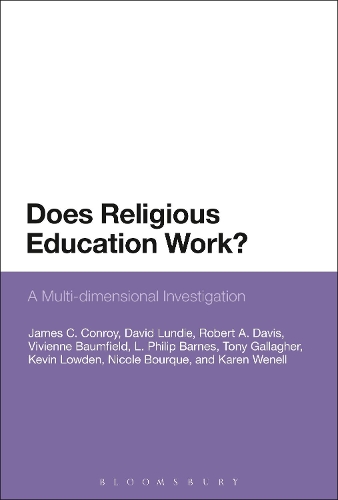
Does Religious Education Work: A Multi-dimensional Investigation
(Hardback)
Available Formats
Publishing Details
Does Religious Education Work: A Multi-dimensional Investigation
By (Author) Professor James C. Conroy
By (author) David Lundie
By (author) Professor Robert A. Davis
By (author) Professor Vivienne Baumfield
By (author) Dr L. Philip Barnes
By (author) Professor Tony Gallagher
By (author) Kevin Lowden
By (author) Dr Nicole Bourque
By (author) Dr Karen J. Wenell
Bloomsbury Publishing PLC
Bloomsbury Academic USA
24th October 2013
United States
Classifications
Tertiary Education
Non Fiction
Educational strategies and policy
Teaching of a specific subject
Educational: Religious studies
Educational administration and organization
371.001
Runner-up for Society for Educational Studies Annual Book Prize 2014 (UK)
Physical Properties
Hardback
280
Width 156mm, Height 234mm
572g
Description
Society for Educational Studies Annual Book Prize winner: 2nd Prize This ground-breaking volume draws upon a rich and variegated range of methodologies to understand more fully the practices, policies and resources available in and to religious education in British schools. The descriptions, explanations and analyses undertaken here draw on an innovative combination of policy work, ethnography, Delphi methods, Actor Network Theory, questionnaires, textual analysis as well as theological and philosophical insight. It traces the evolution of religious education in a post-religious age from the creation of policy to the everyday experiences of teachers and students in the classroom. It begins by analysing the way in which policy has evolved since the 1970s with an examination of the social forces that have shaped curriculum development. It goes on to explore the impact and intentions of a diverse group of stakeholders with sometimes competing accounts of the purposes of religious educations. It then examines the manner in which policy is, or is not, enacted in the classroom. Finally, it explores contradictions and confusions, successes and failures, and the ways in which wider public debates enter the classroom. The book also exposes the challenge religious education teachers have in using the language of religion.
Reviews
Does Religious Education Work is, in the words of its authors, an attempt to unearth the nooks and crannies of the curriculum oddity known popularly as RE. Odd because it is more fraught with religious politics than good and unabashed pedagogical theory and practice, this book is timely in its frank, bold and necessarily non-privileging appraisal of the subject as it truly functions, rather than as the politics says it should. The method applied by this polymath team of educationists, theologians, anthropologists and psychologists renders this unearthing a veritable peeling away of all the myths and pretensions heaped on RE by its attached politics. While focussed entirely on the UK experience, it has universal application and is arguably the most thorough peeling away conducted anywhere in the English-speaking world, if not beyond it. * Terence Lovat, Emeritus Professor of Education, University of Newcastle, Australia *
A salutary and timely reminder to us of the crucial significance of the value of RE in the UK curriculum ... [This book] represents the latest thinking on the subject * Church Times *
This collection of essays in quite an imaginative way foregrounds the smooth and striated pedagogical spaces associated with rhizomatic epistemological inquiry in relation to religious education in contemporary British society. It puts into systematic controversy some of the taken-for-granted notions of religious education and troubles through pragmatic analyses some of the utopias and dystopias of current religious education discourse. For once, religious education is being reconsidered in a critically ontological way that suspends a rush to judgement about the discourse in modern times * Yusef Waghid, Professor of Philosophy of Education, Stellenbosch University, South Africa *
This book offers thought-provoking reflections on religious education as found in classroom practice with year 10 (16+) students across England, Scotland and Northern Ireland. It presents challenging insights into the varied aspirations of teachers and the perceptions of pupils. * Denise Cush, Professor of Religion and Education, Bath Spa University, UK *
Religious education in the UK school setting could have and should have a real impact on students personhood formation and is a necessity in a world characterized by religious pluralism. This is the robust, normative, loaded and sophisticated conclusion of the authors, based on solid conceptual analysis combined with insightful ethnographic empirical research and using the Delphi method. The presented results provide food for reflection for professionals, academics, and last but not least, for UK politicians who are not interested in a simple yes or no in answering the question that forms the title of this book. It provides food for thought that might help to better shape religious education in the future and to deal with indeed existing dysfunctional elements in current religious education practices. * Siebren Miedema, Professor in Religious Education and Educational Foundations, VU University Amsterdam, The Netherlands *
I feel better equipped ... having read this book. -- Andrew Marfleet * Journal of Education and Christian Belief *
Author Bio
James C. Conroy is Professor of Religious and Philosophical Education at the University of Glasgow, UK. David Lundie is a Lecturer in Education at Liverpool Hope University, UK. Robert A. Davis is Professor of Religious and Cultural Education and Head of the School of Education at the University of Glasgow, UK. Vivienne Baumfield is Professor of Pedagogy, Policy and Innovation at the University of Glasgow, UK. L. Philip Barnes is Reader in Religious and Theological Education at King's College London, UK, where he is Programme Director of the MA Degree in Religious Education. Tony Gallagher is Professor of Education and Pro-Vice Chancellor at Queen's University Belfast, UK, where he was previously Head of the School of Education. Kevin Lowden is Research Fellow at the Scottish Council for Research in Education (SCRE) Centre, University of Glasgow, UK. Nicole Bourque is a senior lecturer in Social Anthropology at the University of Glasgow, UK. Karen Wenell is Lecturer in New Testament and Theology at the University of Birmingham, UK.
